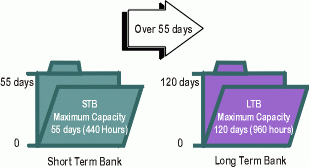
- Step 1: Earning Your Time
- Step 2: Storing Your Time
- Step 3: Using Your Short Term Bank
- Step 4: Using Your Long Term Bank
- Step 5: Time is Money!
- Step 6: If I Transfer, What Happens to Vacation, Sick, and Holiday Time I Have Already Earned?
- Step 7: Using Your Carry Over Bank
Step 1: Earning Your Time
You accrue or earn time off based on how many years of service you have, whether you are an exempt or non-exempt employee. Non-exempt employees accrue PTO on hours paid up to 80 each pay period. Exempt employees accrue PTO based on scheduled hours. (No paid time off is earned on overtime hours). The chart below shows the number of hours (or days) you can expect to earn:
Who is Eligible?
All regular DUHS employees who are normally scheduled to work 40 or more hours every two weeks are eligible to accrue PTO. If you are covered by a collective bargaining agreement, refer to the agreement for eligibility questions.
Non-exempt employees scheduled to work 80 hours each two week period
| Completed Years of Service | Expected Annual Days Earned | Expected Annual Hours Earned | Earned hours per pay period |
|---|---|---|---|
| Less than 4 | 30 | 240 | 9.23 |
| 4-9 | 35 | 280 | 10.76 |
| 9 or more | 40 | 320 | 12.3 |
Exempt employees scheduled to work 40 hours or more each week
| Completed Years of Service | Expected Annual Days Earned | Expected Annual Hours Earned | Earned hours per pay period |
|---|---|---|---|
| Less than 4 | 35 | 280 | 2.91 days, 23.33 hours |
| After 4 years | 40 | 320 | 3.33 days, 26.66 hours |
Step 2: Storing Your Time
As you earn hours each pay period, they are deposited into your Short Term Bank (STB) on each pay period. If you accrue more than 55 days (440 hours), the excess is deposited in your Long Term Bank (LTB). No additional accruals will be applied until the Long Term Bank balance is below 120 days (960 hours).

Step 3: Using Your Short Term Bank
Accrued PTO may be used for vacation, holiday, sick, funeral, or other personal reasons. The STB is the first bank from which PTO is taken.
The maximum number of days you may use in one year from your Short-Term Bank (STB) is 55 (440 hours).
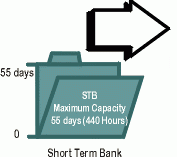
Step 4: Using Your Long Term Bank
If you accrue more than 55 days (440 hours) of Paid Time Off (PTO), the extra days are deposited in your Long Term Bank (see step 2). The days in your Long Term Bank can be used only for family or personal illness. You may use time from your Long Term Bank only after you have used all of your Short Term Bank time or have used seven consecutive days of Family Medical Leave (FMLA) or 56 hours of Intermittent FMLA.
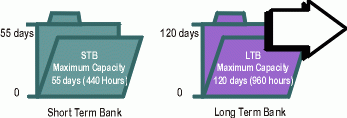
Step 5: Time is Money!
Each year, you will have one opportunity to get paid for hours you have not used from your Long-Term Bank (LTB). The payment will be 50% of your base rate of pay at the time you cash in.
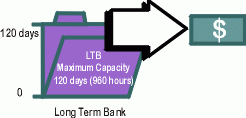
Step 6: If I Transfer, What Happens to Vacation, Sick, and Holiday Time I Have Already Earned?
If you are currently on the Duke University schedule for vacation and holiday time, your vacation and holiday time earned but not used will be deposited into your Short Term Bank when you transfer to DUHS.
If you have unused sick time (for employees currently under the Duke University benefits), this time will be deposited into your Carry Over Bank (COB).
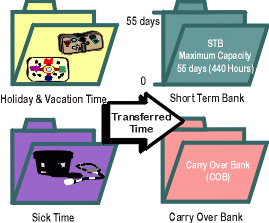
Step 7: Using Your Carry Over Bank
The time in your Carry Over Bank may only be used for personal or family medically-related reasons. The COB can be used after depleting the STB and LTB, or after 7 consecutive days have been taken from the STB for FMLA leave.